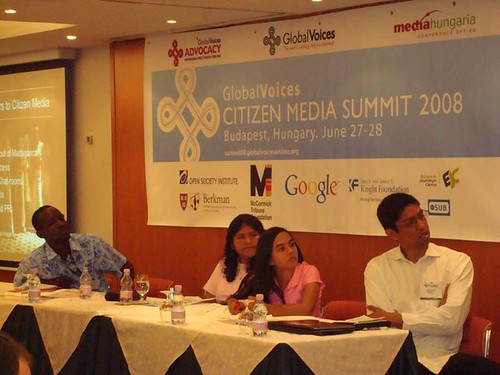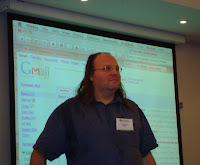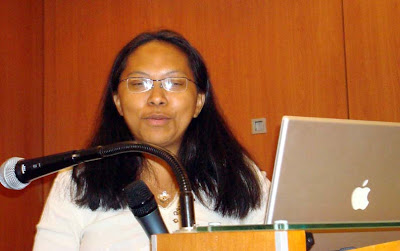The Global Voices Citizen Media summit in Budapest ended successfully. The Rising Voices project was in the spotlight all through the summit. The opening video trailer was well received by the audience which has already been translated into 13 languages and more in progress (at the time of writing this article). In this summit the six new public health project grantees were announced.

In the opening remarks of the summit Global Voices Co-founders Ethan Zuckerman and Rebecca MacKinnon discussed how Global Voices has been working to go beyond the blogging world of elites to promote other voices from other parts of the world.
 Rebecca was almost brought to tears during the Rising Voices project presentation and said:
Rebecca was almost brought to tears during the Rising Voices project presentation and said:
After Global Voices was created, there has always been concern by many people in our community that blogospheres in most countries are dominated by wired elites – and that unless we conduct more active outreach, Global Voices is really “Global Elite Voices.” Rising voices it our first stab at addressing that problem.
The session titled Web 2.0 Goes Worldwide was moderated by Lova Rakotomalala, and Catalina Restrepo (HiperBarrio, Colombia), Collins Dennis Oduor (REPACTED, Kenya), Cristina Quisbert (Voces Bolivianas, Bolivia), Mialy Andriamananjara (FOKO, Madagascar) gave speach. It was live blogged by Rebecca Wanjiku.
 Ethan wrote in his blog that he is blown away every time he reads about the work the Rising Voices grantees are doing. He writes:
Ethan wrote in his blog that he is blown away every time he reads about the work the Rising Voices grantees are doing. He writes:
Collins Oduor, from the REPACTED community theatre project in Nakuru, Kenya, starts his presentation with a story – to paraphrase:
A young girl is very sociable and likes to play with all the children in the village. Her mother is worried that she’s too friendly and doesn’t want her playing with the boys in the village. So she tells her daughter, “You can’t climb trees with the boys because they will look up your dress and see your underpants.” So the next day, the girl takes off her underpants and climbs the tree.
Oduor ends his story with the single word, “Communication” and the room breaks into laughter. REPACTED specializes in communicating through community theatre.
Catalina Restrepo of the HiperBarrio project in Medellin, Colombia, presents in Spanish, translated by Jules Rincon. The focus of the HiperBarrio project is to transform the image of the communities of La Loma and Santo Domingo. Both communities have historically been viewed as violent slums, places that no one should visit. By letting people in their communities who tells local stories, they’re challenging the impressions people have of these neighborhoods, and are starting to see visitors from both Medellin and around the world who want to learn about these communities.

Mialy Andriamananjara is one of the coordinators of the remarkable Global Voices Malagasy, and a co-founder of FOKO Madagascar. The project is encouraging high school, college and journalism students to explore citizen media. This is a challenge, given both digital divide issues (the cost of connectivity, frequent electrical blackouts) and perception issues. Blogging is seen as an activity that isn’t very serious, and that Malagasy community frowns on people “standing out” through writing online. But the project has been very effective at technology training and in helping people break into journalism. It’s had some unexpected side effects as well – one of the FOKO groups ended up organizing the first translation and performance of the Vagina Monologues in Malagasy. Another project, “Helping Kamba“, called attention to child who was born with a severe deformity.
Voices Bolivianas, led by Cristina Quisbert and Eduardo Avilla, focuses on the voices of indigenous people, especially indigenous women in Bolivia. Cristina explains that there are strong tensions between the majority indigenous population in Bolivia and the Spanish-speaking minority. In digital spaces, people who speak languages like Aymara are much less well represented than Spanish-speakers. Cristina’s blog, Bolivia Indigena, focuses on these issues, and Voices Bolivianas is working to try to get more people writing and talking about these issues.
The Danish daily Politiken.dk published an article on Rising Voices titled “It gives voice to the neglected people“. The paper quotes Cristina:
“I do it because none of the Bolivian newspapers and mass media bother. There are over 30 different indigenous peoples in this country, but their voices will only be heard in the blogs.”
And Mialy:
“We do not just want to be known by the Madagascar lemurs (brought to fame by the animation film ‘Madagascar’) but will make the world aware of our island and our people.”
David Sasaki translates another article by blogger journalist Rosa Jiménez Cano published in ElPais.com. Read it for more perspectives.
Patrick Philippe Meier writes an article on the session in his blog iRevolution.
Victoria Stodden notes:
At the end of the panel, the question was asked ‘how can we help?’ The answer was perhaps surprising, although money is always welcome what is needed is skills. Specifically, people with web design or IT skills can come and stay with a blogging community for a week or two and teach people how to do things like design a web page, display their wares online, essentially support people in computer use.
We will be bringing to you opinions and reactions on the work that Rising Voices does. But first a round of applause for these projects and the great panelists who gave a prominent exposure of Rising Voices to the world.
Support our work
Since Rising Voices launched in 2007, we’ve supported nearly 100 underrepresented communities through training, mentoring, microgrants and connections with peer networks. Our support has helped these groups develop bottom-up approaches to using technology and the internet to meet their needs and enhance their lives.
Please consider making a donation to help us continue this work.




6 comments
Hey Rezwan we have 17 translations now ! I now there are more and more to come . For sure this is our time and we’re taking over the world one blog at a time. Thank you all for giving Malagasy youth this opportunity and bringing their voices to the world!
Thanks for summing up the Summit, it looks like it was a success. Its great to hear about others blogging and helping to get other minority and indigenous voices heard in the larger world. It is a tough job and I honor your efforts. Congrats – lets keep it growing.